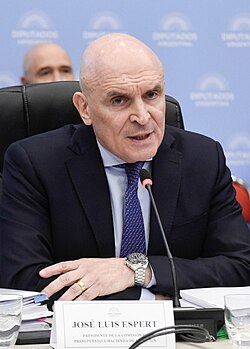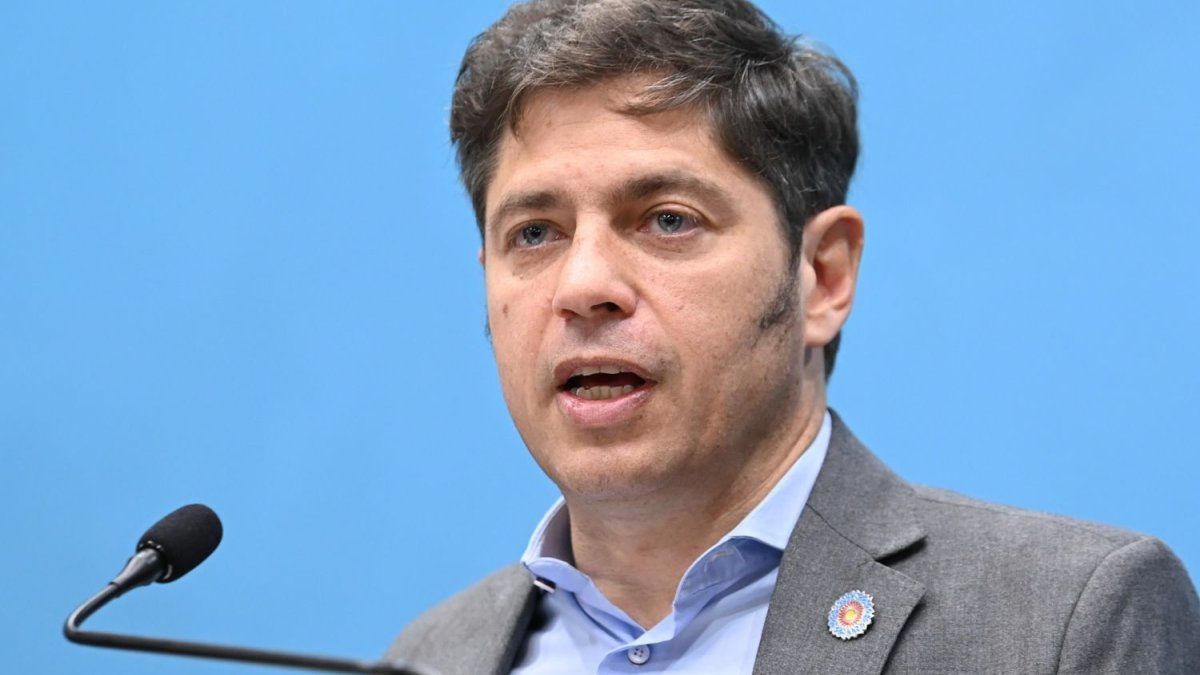
Far-right leader Javier Milei won Argentina’s mid-term legislative elections, strengthening his position for the final two years of his government.
President Milei has already announced that he will send regressive and far-reaching bills to Congress: labor, tax and pension reforms. All three sets of bills share the same goal: favoring business owners and the most powerful sectors of the economy, while harming workers and retirees.
Argentine society is impoverished: The economy is in recession, factories are closing, there are layoffs, repression of retirees, several serious corruption cases, and the country is increasingly indebted.

Among them are the bribes received by the Secretary General of the Presidency, Karina Milei —the President’s sister— at the Disability Agency, according to the account.
The agency’s head, Diego Spagnuolo, is also a friend and personal lawyer of Javier Milei.


The first candidate for national deputy for LLA was José Luis Espert, who had to resign after it was confirmed that he had received dollar transfers from Fred Machado, accused of drug trafficking and about to be extradited to the United States.

And then there is the Libra case, in which both the president and, once again, his sister are accused of fraud in Argentina as well as in the United States.
In fact, the government had to be rescued not only by the IMF but also by the United States. It is clear whose interests Milei serves—the question, then, is how he managed to win: Trump’s “qualified vote” was decisive.
A few days before the election, Milei was going through one of the most difficult moments of his presidency, which began in December 2023. The Argentine economy was on the verge of default, and all economists—including those from the IMF—were predicting a major devaluation of the national currency, the peso. At that critical moment, when the Central Bank no longer had reserves to sustain the exchange rate, “the uncles, Donald Trump and Scott Bessent,” appeared. The political and economic support from the U.S. government and its Treasury proved decisive.

When Trump said that “Argentines were dying,” many thought the statement could hurt Milei, since it portrayed him as responsible for the crisis—and because Argentina has a long political tradition of resistance to U.S. influence.
Let’s recall that Peronism, the major center-left opposition movement, was founded in 1945, and its first electoral slogan was “Juan Domingo Perón or Spruille Braden”—referring to the then U.S. ambassador in Buenos Aires. Braden had become the key figure behind the right-wing, anti-Peronist alliance. From that moment on, the rallying cry “Homeland yes, colony no” united Argentina’s popular struggles.

On the economic front, there was direct intervention by the U.S. Treasury, “buying pesos.” Unbelievable, considering that Milei had won the presidency promising to dollarize the economy.
Now, two years later, he needs the U.S. to sell dollars—that is, to buy Argentine pesos. All this is necessary to prevent the dollar’s value from skyrocketing, because Argentines know from historical experience that such jumps trigger more inflation.
Argentina has a “bi-monetary” economy—pesos and dollars—and the scarcity of foreign currency is a structural weakness. Citizens want nothing to do with another inflationary rebound on top of the current 2% monthly rate.
The prevailing mood was that, if Milei did not secure a favorable result, a major devaluation would follow the very next day. People were afraid. They remembered the social uprising of 2001, when 39 people were killed; the repeated spikes of runaway inflation—including two hyperinflations — and the high inflation rate that marked the end of the previous administration.
In that context, the people went to the polls. Milei’s acknowledgment of Trump’s support was explicit—he described it as of “vital importance.” In contrast, the governor of Buenos Aires Province, Axel Kicillof, offered a blunt assessment: “It was blackmail—they threatened to sink the country.”

“Liberty Advances”
In truth, the results were within the range of the government’s most optimistic polls. But the real surprise—the one that changed the political climate—came from Buenos Aires Province, which concentrates 37% of the national electorate.
It is governed by Peronist Axel Kicillof, who less than two months earlier had won the local elections by 13 points over Milei’s party, La Libertad Avanza (LLA).
This time, the story was completely different: LLA 41.45% vs. Peronism 40.95%. A half-point difference—nothing and everything at once, because it reversed the result from less than two months earlier in the country’s most important district.
The explanation lies in voter turnout: 7% more people cast ballots than in September. Most were voters close to the government who had previously stayed home out of disappointment with Milei’s administration.
What changed their minds was fear—of a social explosion and inflationary chaos—combined with a backlash against another Peronist victory. They went to the polls—and changed the outcome.
Even so, La Libertad Avanza gained ground nationwide. The national result was LLA 40.7% against Peronism’s 34.9%. The right-wing vote total is already historic in Argentina—and so is Peronism’s. The problem is that roughly 25% of the electorate—the swing voters who decide elections—has shifted to the right over the past two years.
As a result, the political map of Argentina’s provinces now shows far more violet—Milei’s color—than blue, the color of Peronism. In eight of the 24 districts, the margin was minimal, but the sum favored the far right.

Now Milei has a Congress highly favorable to his agenda—both in the Chamber of Deputies and in the Senate—and a political climate in which centrist sectors are drawing closer to the government to offer their support. Counting his allies, Milei will likely have enough votes to pass any law he wants, at least in the coming months.
Argentina in Reverse
Milei’s campaign slogan was “Liberty Advances or Argentina Goes Backward.” Everything suggests that both premises will move forward together. Milei won, and the social situation will continue to deteriorate.
More trade liberalization, less domestic production; more debt and financial speculation, less employment and national development; greater alignment with the U.S., less national sovereignty; more concentration of wealth in fewer hands, greater social inequality.

Argentina’s subordination to the U.S. is total. Bessent openly admitted that the goal is “to keep China out” of Argentina while promoting “the arrival of private U.S. companies and their cooperation over rare earth resources.”
Natural resources are at stake—and the U.S. seems not to regard them as “Argentine.”
Back in 2023, the head of the U.S. Southern Command, Laura Richardson, had already said: “Latin America has 60% of the world’s lithium, 30% of its copper, as well as gold, iron, and other rare metals essential to technology.”
Argentina’s regression is deep, strategic and may become structural—very difficult to reverse. And Milei’s government appears ready to hand over the country’s natural resources in exchange for this temporary financial support that helps it survive the chronic shortage of dollars. “Homeland, perhaps not. Colony, maybe so…”

CovertAction Magazine is made possible by subscriptions, orders and donations from readers like you.
Blow the Whistle on U.S. Imperialism
Click the whistle and donate
When you donate to CovertAction Magazine, you are supporting investigative journalism. Your contributions go directly to supporting the development, production, editing, and dissemination of the Magazine.
CovertAction Magazine does not receive corporate or government sponsorship. Yet, we hold a steadfast commitment to providing compensation for writers, editorial and technical support. Your support helps facilitate this compensation as well as increase the caliber of this work.
Please make a donation by clicking on the donate logo above and enter the amount and your credit or debit card information.
CovertAction Institute, Inc. (CAI) is a 501(c)(3) non-profit organization and your gift is tax-deductible for federal income purposes. CAI’s tax-exempt ID number is 87-2461683.
We sincerely thank you for your support.
Disclaimer: The contents of this article are the sole responsibility of the author(s). CovertAction Institute, Inc. (CAI), including its Board of Directors (BD), Editorial Board (EB), Advisory Board (AB), staff, volunteers and its projects (including CovertAction Magazine) are not responsible for any inaccurate or incorrect statement in this article. This article also does not necessarily represent the views the BD, the EB, the AB, staff, volunteers, or any members of its projects.
Differing viewpoints: CAM publishes articles with differing viewpoints in an effort to nurture vibrant debate and thoughtful critical analysis. Feel free to comment on the articles in the comment section and/or send your letters to the Editors, which we will publish in the Letters column.
Copyrighted Material: This web site may contain copyrighted material the use of which has not always been specifically authorized by the copyright owner. As a not-for-profit charitable organization incorporated in the State of New York, we are making such material available in an effort to advance the understanding of humanity’s problems and hopefully to help find solutions for those problems. We believe this constitutes a ‘fair use’ of any such copyrighted material as provided for in section 107 of the US Copyright Law. You can read more about ‘fair use’ and US Copyright Law at the Legal Information Institute of Cornell Law School.
Republishing: CovertAction Magazine (CAM) grants permission to cross-post CAM articles on not-for-profit community internet sites as long as the source is acknowledged together with a hyperlink to the original CovertAction Magazine article. Also, kindly let us know at info@CovertActionMagazine.com. For publication of CAM articles in print or other forms including commercial internet sites, contact: info@CovertActionMagazine.com.
By using this site, you agree to these terms above.
About the Author

Hernán Viudes is an independent journalist and a graduate from The Faculty of Social Sciences at the University of Buenos Aires. He lives in Argentina and enjoys music, culture and football.
Hernán can be reached at hernanviudes@gmail.com.




I do not why but for some reason you will never see any criticism
of Russia and Putin in Covert Action Magazine. Here are some possible reasons but but not necessarily the actual reason.
Key reasons some American magazines may not criticize Russia include:
Political Polarization: The U.S. media landscape is highly polarized. Some outlets tailor their content to an audience with specific political alignments, which may be more sympathetic to Russia due to shared ideological elements, such as appreciation for authoritarian leadership, social conservatism, or anti-establishment sentiment.
Media Business Model: To survive and attract advertisers, media outlets must compete for a specific audience’s attention. This can lead to partisan coverage that reinforces the readers’ existing views, rather than challenging them, meaning an audience not interested in Russia criticism will likely not see it in their preferred publications.
“Whataboutism” and Hypocrisy Arguments: Some sources or commentators in U.S. media might employ a tactic called “whataboutism,” deflecting criticism of Russia by pointing to perceived hypocrisies in U.S. foreign policy (e.g., the invasion of Iraq). This approach may result in less direct criticism of Russia’s actions.
See, Biden did not go to prison after the end of his term, but for Trump, you can be sure that he will go, because his financial malfeasance is not covered by presidential immunity. Then we will see if Putin’s traitorous Russia will still be so arrogant and traitorous. They killed the bosses of Wagner and betrayed Syria.This is enough to make me want NATO to succeed in expelling all the Russians from Crimea, Donetsk and Lugansk.
At the BRICS meeting in Kazan in 2024, Putin and Erdogan agreed. Russia side with HTS. So I pray to God to destroy and dismember BRICS and Russia, because Russia is a treacherous conglomerate of evil and must perish. Trump will probably end up in prison because Argentines will not be able to vote in the US elections. And the Democrats will probably win and will probably accomplish a useful and honest task, which is the destruction of traitorous Russia.